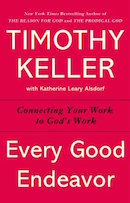And That Goes for Cussin’ Too
Daily Reflection / Produced by The High Calling
But among you there must not be even a hint of sexual immorality, or of any kind of impurity, or of greed, because these are improper for God’s holy people. Nor should there be obscenity, foolish talk or coarse joking, which are out of place, but rather thanksgiving.
Ephesians 5:3-4
As we saw in yesterday's reflection, Ephesians 5:3 insists that sexuality immorality must not even be named among God's holy people. We who have been set apart by God for relationship with him and for participation in his work must avoid sexual activity that is contrary to God's intentions.
But that's not all. The Greek imperative in verse 3, which could be literally translated as "must not be named among you," governs verse 4 as well. Included in that which must not be named among Christians are "obscenity, foolish talk, or coarse joking, which are out of place." We are not to engage in what folks in my part of the world call cussin'.
Why? What's the big deal about cussin'? Is this one more case of Christians getting hung up on things that really don't matter? No, I don't think so. A few verses ago, we were warned about letting "unwholesome talk" come out of our mouths. Rather, we ought to speak that which "is helpful for building others up" (4:29). Paul assumes that what we say really matters. Our words have the power to tear down or to build up. They can distract us from what is important or focus our attention on the best things. They can cheapen life or enrich it. Thus, obscene and foolish talk isn't morally neutral. At best, it fills the air with emptiness. At worst, it degrades human life and dishonors those who have been created in God's image.
Now, it's true that sometimes we Christians can get overly worked up about cussin', while failing to attend to other sins, like pride or judgmentalism. Surely, this kind of attitude does not reflect the love of God. But, without getting things out of balance, we might do well to examine our words, both their purity and their impact. We want every part of us, including our speech, to be an expression of our holiness as God's special people.
QUESTIONS FOR FURTHER REFLECTION: Are there times when you dabble in obscenity or foolish talk? When? Why? Are there times when you fail to use words to build up people and to honor God? What might help you to take maximum advantage of the power of your words?
PRAYER: Gracious God, thank you for giving me the power of speech. By doing this, you have entrusted much to me.
Help me, I pray, to use well this power. May I learn to avoid obscene or foolish talk. Instead, may I use my words to build up, to teach, to inspire, to love. Amen.
______________________________
How to Share Your Faith at Work
Let’s admit it: It can be awkward to share our faith at work. The fear of damaging relationships and making the workplace that much more difficult (we do, after all, have to deal with these people on a daily basis). The fear of repercussions from those we work for. The fear of coming across as, well, just weird. In the stories found in the series, How to Share Your Faith at Work, we find practical ways to naturally share with people the thing that is most precious in our lives – our relationship with Jesus Christ.
Image above by Sean McGrath. Used with Permission. Via Flickr.






